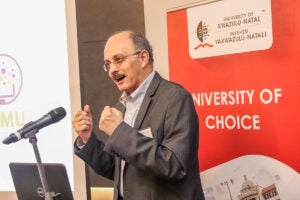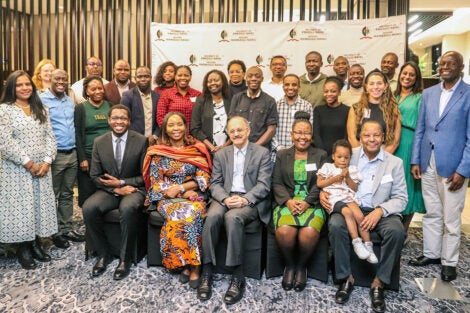October 20, 2023 — Advances in data science have the potential to improve health and well-being for people in Africa, but this promise has been limited by a shortage of local data scientists. Since 2021, the Data Science Initiative-Africa has been working to help fill that gap. Through the initiative’s WASHA Takwimu (Swahili for Ignite Data) program—funded by a training grant from the National Institutes of Health—researchers from Harvard T.H. Chan School of Public Health and Heidelberg University in Germany have been working with the University of KwaZulu-Natal (UKZN), South Africa, to develop a data science training hub at UKZN. The program also supports researchers at partner institutions in Ghana, Nigeria, Tanzania, and Uganda.

“WASHA Takwimu provides training on data science methods and their applications for addressing policy-relevant questions in two key areas: health systems strengthening; and climate change, food systems, and planetary health” said Wafaie Fawzi, who leads the initiative and is the Richard Saltonstall Professor of Population Sciences, and Professor of Nutrition, Epidemiology, and Global Health at the Harvard Chan School. It is part of the Africa Research, Implementation Science, and Education (ARISE) Network, a platform for collaborative education and research activities in sub-Saharan Africa launched by Fawzi and colleagues in 2014.
A central part of the program is a two-year postdoctoral fellowship in which trainees split their time between Harvard Chan School, Heidelberg University, and UKZN. The first cohort of fellows is actively engaged in the program, and three more will begin this fall.
Over the summer, the program’s leadership team held a strategic planning meeting in Durban, South Africa. The meeting was held in conjunction with its second annual symposium, at which speakers focused on ways to transform African food systems and target interventions on the continent to address the effects of climate change.
“There is a bidirectional relationship between the food that we eat and climate change,” Fawzi said. Recent droughts, floods, and heatwaves have contributed to dramatic food insecurity. “Being able to make early predictions of the implications of climate-related events, and finding ways to mitigate them, requires large volumes of data—and training in methods to make use of them,” he said. Looking at ways that dietary patterns can be optimized for the health of people and the planet is another important objective of these efforts, said Fawzi.
Topics related to climate change and food systems were explored in more detail during an intensive short course held at UKZN in conjunction with the symposium. Fawzi co-facilitated the course along with colleagues from partner institutions. WASHA Takwimu regularly holds such courses, which are open to researchers from partner institutions and are often offered with a virtual option, in addition to regular monthly seminars.
“It was exciting to see the engagement from young scientists who are keen to learn about these critical issues, and eager to work across disciplines to improve the health of populations,” Fawzi said.
Looking ahead, WASHA Takwimu’s plans to further strengthen the collaboration between UKZN and Harvard through faculty exchanges, and the establishment of a new master’s in health data science program at UKZN.
Photos: Courtesy of Data Science Initiative-Africa
